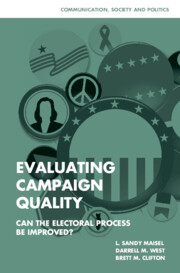Preface
Published online by Cambridge University Press: 03 December 2009
Summary
This book analyzes whether campaign discourse and conduct can be improved through the reform of contemporary elections. For a number of years, voters and academic observers have been dissatisfied with a number of elements of American campaigns. Contemporary races are seen in several circles as too negative, too superficial, and too unfair or misleading. Based on these complaints, a variety of reform organizations have targeted millions of dollars to improve the situation.
Through their efforts and those within the academic community, a wide range of reform initiatives have been undertaken. Ideas such as voluntary codes of conduct, industry self-regulation, training schools, certificate programs, tougher ethics rules for consultants, and the encouragement of more substantive venues such as candidate debates, town meetings, and issue forums have been promulgated to improve the performance of American elections.
In this volume, we seek to evaluate whether these activities have improved the level of campaign discourse and conduct in U.S. House and Senate campaigns. Using a variety of information derived from a national public opinion survey, a survey of political consultants, focus groups, in-depth elite interviews, and a detailed content analysis of major campaign communications, we argue that while some reforms have improved campaigns, the overall impact has been disappointing. We suggest that this failure is due to a lack of understanding of the incentives facing campaign professionals. Reforms will not be successful unless they alter the incentives that candidates have to engage in bad behavior and avoid substantive discussion.
- Type
- Chapter
- Information
- Evaluating Campaign QualityCan the Electoral Process be Improved?, pp. xi - xivPublisher: Cambridge University PressPrint publication year: 2007

